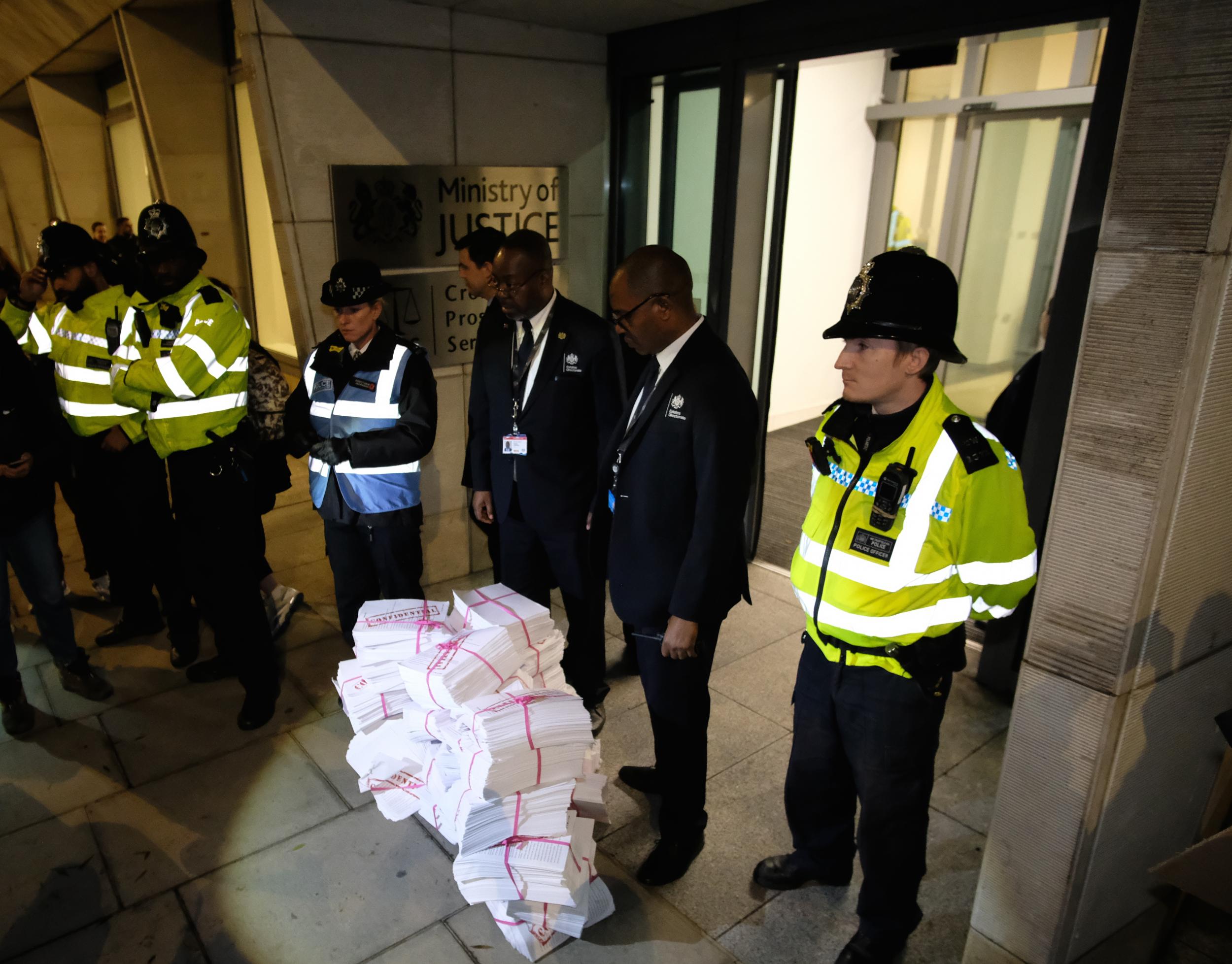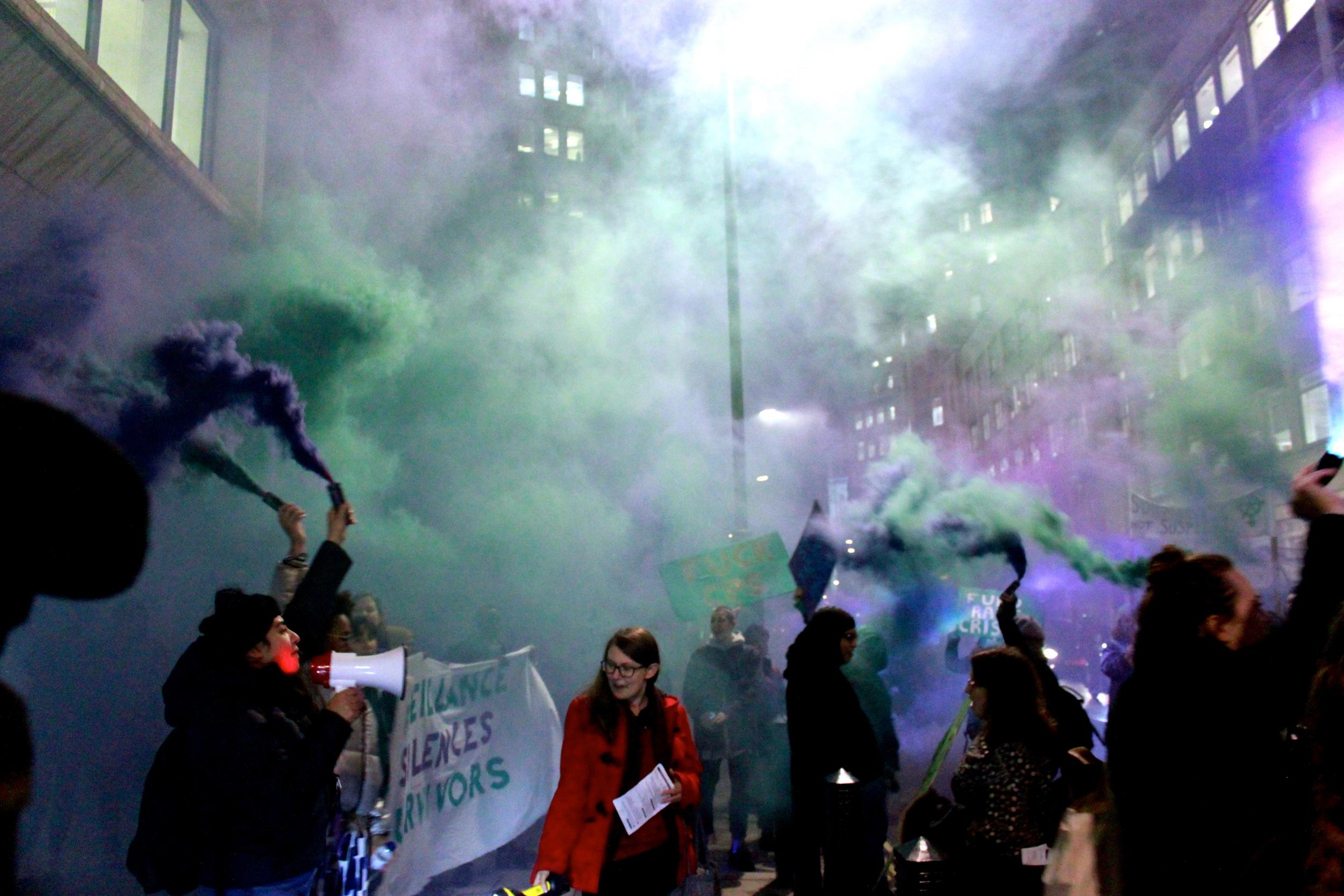Police accuse prosecutors of 'raising bar' for rape cases after scandal over collapsed trials
Crown Prosecution Service says ‘nothing has changed’ after claims that ‘weak’ cases were being dropped

Senior police officers have accused prosecutors of “raising the bar” for evidence required to take rapists to court, following a scandal over collapsed cases.
Victims’ groups say women reporting rape are frequently told their case will not reach court unless they allow police access to their mobile phones and private communications, or sign statements that let investigators access their health records and other personal information.
There are fears that as rape prosecutions fall, distress and intrusion will cause victims to drop charges or prevent them from coming forward.
Protesters caused the Crown Prosecution Service (CPS) headquarters to be shut down earlier this week as they demanded authorities stop demanding vast amounts of material from sexual abuse survivors.
The CPS has denied any change in its guidance or training, and insists that all staff apply its legal code regardless of the type of crime being considered.
But Metropolitan assistant commissioner Martin Hewitt, vice chair of the National Police Chief’s Council (NPCC), said there were regional inconsistencies in how sexual offences were being dealt with “that can only be explained by what the police and CPS are doing”.
Speaking at a conference in central London, he said long-term problems had been worsened by a series of collapsed rape cases that started last December.
Among the most high-profile was that of student Liam Allan, who had 12 rape and sexual assault charges against him dropped after the discovery of messages showed the claimant pestered him for “casual sex”.
Mr Hewitt, who is the former national lead for sexual offences, said the case caused police, prosecutors and judges to respond “cautiously and nervously” to rape allegations.
“We’re seeing enormous delays in cases, because some police officers and prosecutors are taking the safe route by asking for everything and demanding everything,” he added.
“And that is not just happening with prosecutors, it is happening with judges.”
Mr Hewitt, of the Metropolitan Police, said that shortly after Mr Allan’s case collapsed in December 2017, a judge ordered all information from an iPad to be downloaded.
It required 15 officers to work hundreds of hours of overtime over an entire weekend.
“This not a situation that’s new but it’s been exacerbated by the things that have happened and we’ve really all got to step up because it looks as though it’s getting worse rather than better,” he warned.
Assistant chief constable Ben Snuggs, of Hampshire Police, told the same conference that the bar for charging had started to “feel very high”.
He added: “I’m concerned about the impact that may be having on victims’ confidence.”
Dame Vera Baird, the Association of Police and Crime Commissioners (APCC) lead for victims, said whistleblowers from inside the CPS itself claimed they had been encouraged to drop “weak” cases to improve conviction rates.
She questioned whether prosecutors were starting to take a “bookmakers’ approach” and couch their decisions on whether juries had convicted similar cases in the past.
Sue Hemming, director of legal services at the CPS, admitted that the implications of Mr Allan’s case had “resonated through the whole criminal justice system”.
She told officers that “extensive action has been underway over the past year to bring about change, not just in how cases are handled, but in the wider culture in the CPS and policing.”
She added: “Many of the issues that manifested themselves earlier this year were down to identifying reasonable lines of inquiry in relation to digital material.”
But when officers asked why the bar for evidence had been raised, she insisted nothing had changed.
Ms Hemming said: “The standard for charging any case is exactly the same. It’s a realistic prospect of conviction under the code of crown prosecutors and it has never been any different, and it has never changed.”
In September, a lawyer specialising in sexual offence cases told The Independent that the CPS had been pushing rape prosecutors to improve conviction rates.
Cris McCurley, a family law partner at Ben Hoare Bell, said: “Prosecutors were being told only to take on the nailed-on cases where you know there will be a conviction, because ‘we need to make the rate better’.”
Ms Hemming refuted the claims, but admitted that refresher training did address an inspectorate’s finding that 10 per cent of alleged rapes prosecuted fell short of the code.

“We have not either within the training or anything else we’ve done in the CPS told people to have a higher standard or a lower standard,” Ms Hemming added.
She said the CPS was also working with police to draw up guidance on when officers should obtain “Stafford statements” from victims to access their medical history and other records.
MPs and campaigners have claimed the practice causes women to drop cases or not report them at all, over fears irrelevant material will be used by the defence to undermine them in court.
Opponents cite cases including one where the fact a rape victim forged her mother’s signature at school was presented as evidence she could lie.
Ms Hemming said different agencies were working to get the balance between privacy and a fair trial right, and pointed out that the CPS’s guidance was supported by the Court of Appeal this week.
The judgment was sparked by a judge who stayed proceedings after ruling that the failure to seize a mobile telephone belonging to one of the complainants meant the defendant could not have a fair trial.
“We are very clear that seeking to examine the mobile phones of claimants and witnesses should not be something that is pursued as a matter of course in every case,” Ms Hemming said. “It is crucial that only reasonable lines of inquiry are pursued to avoid unnecessary intrusion into a complainant’s personal life.”
She added that Stafford statements are not a CPS requirement, and the NPCC is drawing up guidance.
It will call on officers to ditch the blanket permission in favour of making specific requests to victims for each document needed.
Baroness Newlove, the Victims’ Commissioner for England and Wales, said women were “disproportionately having their personal lives investigated”.
She added: “Victims are fed up of being a piece of evidence,” she added. “I suspect many victims are being deterred from reporting rape because of invasive disclosure.”
